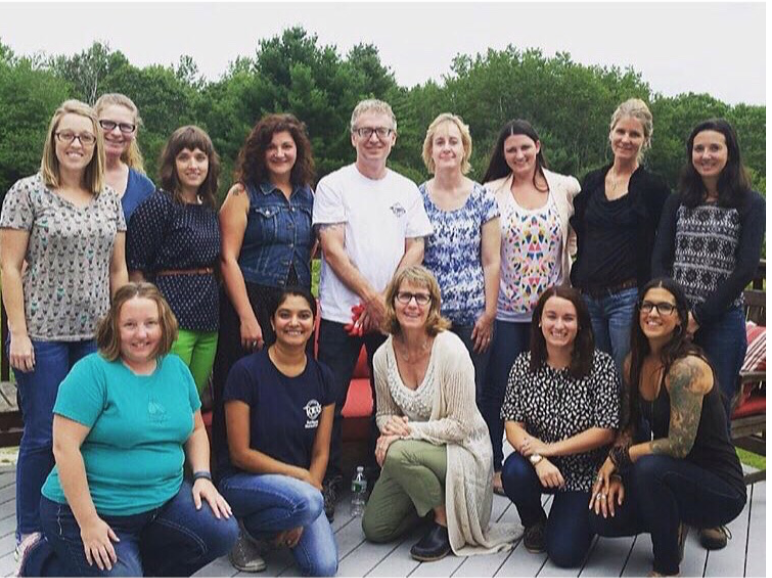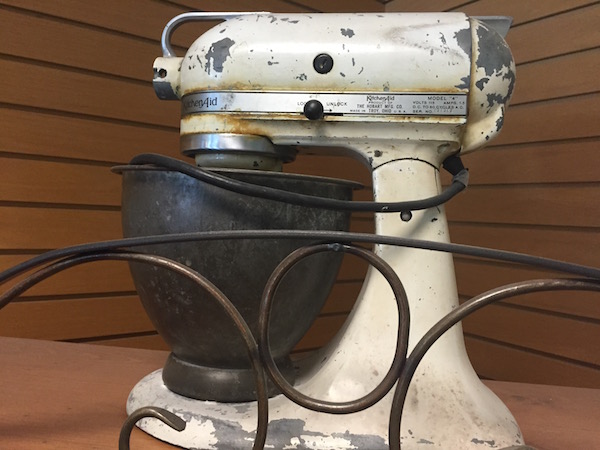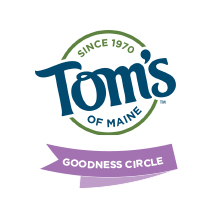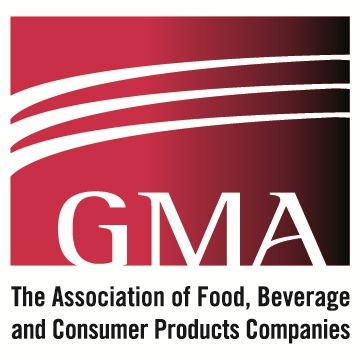 I recently returned from a quick trip to Maine as part of the Tom’s of Maine’s Goodness Circle. 13 of the 20 Goodness Circle bloggers were able to make the trip. Coming from nearby places, such as Vermont, and from faraway places, such as California, we had an adventurous few days of eating, laughing, volunteering, trying new products, brainstorming, and learning about the evolution of the company. And yes, we discussed Colgate-Palmolive.
I recently returned from a quick trip to Maine as part of the Tom’s of Maine’s Goodness Circle. 13 of the 20 Goodness Circle bloggers were able to make the trip. Coming from nearby places, such as Vermont, and from faraway places, such as California, we had an adventurous few days of eating, laughing, volunteering, trying new products, brainstorming, and learning about the evolution of the company. And yes, we discussed Colgate-Palmolive.
This is my second year participating in the Goodness Circle. I have always been rather hesitant about tying myself and Eco Child’s Play to a particular brand. I have been approached before, as well as offered other travel experiences, but my commitment to truth, integrity, and eco-values has prevented bonding these relationships. Why was Tom’s different?
When I was 16-years-old, I became a vegetarian. As I began to question the sustainability, ecological, and ethics of ingredients I was feeding my body, I also began to examine my personal care products. That’s when I found Tom’s
Almost 30 years ago, Tom’s was one of the few personal care brands I could find that used natural ingredients. I could find Tom’s at a small, local health food store. This was before Whole Foods came to my hometown. This was before “natural” was a marketing term.
Tom’s of Maine is owned by Colgate-Palmolive
In 1970, the same year of the very first Earth Day, Tom and Kate Chappell started the company wanting to use only natural laundry detergent and personal care products for their family.((http://blog.tomsofmaine.com/index.php/earth-day-and-toms-of-maine-celebrating-45-years/))

45 years later, Tom’s is no longer an independent company owned by the Chappells, yet it appears to have maintained their original vision to use natural, sustainable ingredients, as well as give back to the community and environment.
From this small start, Tom’s of Maine grew and developed into a different kind of company, one based on the belief that people and nature deserve respect. Over the years our product line moved from non-phosphate laundry detergent to natural personal care products such as the first natural toothpaste (1975) and deodorant (1976).
We’ve grown in size and in 2006, we became part of the Colgate-Palmolive Company. But our simple, direct approach hasn’t changed one bit: we listen to what our customers want (and don’t want) in their products, we learn how it can be done, and we respond with effective natural, sustainable and responsible solutions.((http://www.tomsofmaine.com/company))
After visiting the Tom’s factory in Sanford, Maine, participating in one of their community service activities, and discussing Colgate with the Tom’s employees, I believe the above statement is true. Tom’s of Maine has remained faithful to the original vision of the Chappells under a Fortune 500 parent company.
Even though Tom’s has been able to maintain its small company ethos under the Colgate parentage, it is still a concern for consumers, including myself. I want to know that the buying power I have as a natural product consumer does not inadvertently support lobbying efforts for chemicals, anti-gmo labeling, environmental degradation, social inequality, etc.
In 2013-2014, Colgate-Palmolive gave more money to Republican party candidates, but the numbers are relatively close for both parties and really small for the size of the company. ((http://influenceexplorer.com/organization/colgate-palmolive-co/9d2c826e976f40b4bcc767790060b49f?cycle=2014)). Colgate has spent the largest amount of lobbying money on for the chemical industry. ((http://www.opensecrets.org/orgs/summary.php?id=D000032736))
What concerns me the most is Colgate-Palmolive is a member of the Grocery Manufacturers Association (GMA). ((http://www.colgate.com/Colgate/US/Corp_v2/LivingOurValues/Sustainability_v2/Colgate_Sustainability_Report_Partnerships_2015_8.pdf))((http://occupy-monsanto.com/boycott-the-grocery-manufacturers-association-member-companies/))
As Food & Water Watch explains:
The Grocery Manufacturers Association (GMA) represents more than 300 of the United States’ biggest food and beverage companies. GMA members also include some of the largest seed and biotechnology companies (like Monsanto, Dow AgroSciences and Syngenta).
The GMA lobbies the federal and state governments to keep business costs low for its members by keeping regulations loose or even voluntary. The priorities of the GMA align its member companies’ bottom lines, and not with the health and well-being of its consumers. The GMA fights to keep genetically engineered foods (GMOs) unlabeled, to oppose mandatory country-of-origin labeling and to block any limitations on marketing junk food to children.((https://www.foodandwaterwatch.org/factsheet/industry-profile-grocery-manufacturers-association/))
The GMA has spent millions to defeat state initiatives requiring GMO labeling.((http://www.sourcewatch.org/index.php/Grocery_Manufacturers_Association)) Yes, this is a big concern for me!
The GMA also supports outsourcing. ((http://www.gmaonline.org/downloads/research-and-reports/ExecSummary_20080918_v2.pdf)). Outsourcing typically involves shifting to resources overseas to save money; however, in the case of Tom’s of Maine, this has been avoided.
One thing I learned on the trip was that not all of Tom’s products are made in Maine. The product line is so extensive, that vendors in other states, Canada, and Switzerland (toothbrushes) manufacture many of the products. When one of these vendors shifted production to China, Tom’s ended their relationship and found a different one closer to home. The working conditions for employees in China did not meet the company’s criteria for social responsibility.

We toured the Sanford, Maine factory and watched mouthwash move through the assembly line. Toothpaste, mouthwash, and deodorant are made in this facility that employees 62. I was surprised at the small size of the facility. We met employees that had been with the company from 19 years to four days. They all seemed content and proud of their work.
One benefit of ownership by Colgate-Palmolive is an increased distribution of Tom’s products. You may have noticed Tom’s of Maine products now available in many conventional stores. When I leave my local area full of health food stores and coops, I am pleased to find Tom’s in parts of the country less environmentally focused.
At the Kennebunkport resort we stayed at, one of the employees asked me about Tom’s toothpaste and deodorant. She did not fit the “Whole Foods” type. She did not eat organic food. She shopped at Walmart. She had seen Tom’s there. As I talked to her, I could see her general interest in natural personal care products. I gave her the free products Tom’s had given me in my goodie bag. She was so grateful. This is the kind of person Colgate ownership and distribution can reach. I can’t help but feel this is a good thing. I want all humans to use natural products, not just the crunchy types.
Of course, there is always hope that the smaller company will influential the larger parent company to be more socially and ecologically responsible. This was expressed by many of the other bloggers in the Goodness Circle while we were in Maine. Has this happened? I don’t know, but I assume part of why Colgate acquired Tom’s was because of the growth in the natural product market. Consumers want natural products. Consumers are concerned about the toxicity of ingredients. Natural is going mainstream, hence many natural food and personal care companies have been purchased by larger, conventional ones.
Is corporate takeover of natural companies inevitable? Not necessarily. There are some hold outs, and I strongly support them; however, Tom’s just may be the model of how to do it while maintaining the founders’ vision.
Given all of these concerns, you might ask, “Why did Eco Child’s Play join the Tom’s of Maine Goodness Circle?” The purpose of our trip was not to “sell” us Tom’s of Maine or to convince us not to be concerned about Colgate. Many of the employees brought up their own concerns with these issues without any prompting. You can tell the employees reflect upon the changes that have occurred since Colgate took over, but they still believe in Tom’s vision. There have been challenges.
Tom’s of Maine is doing a lot of things right! By the end of 2015, they will have given away $1.4 million to charities and non-profits to make our communities a better place. Employees regular volunteer 5% of their regular work schedule. They are constantly evaluating ingredients and listening to the concerns of their customers. They have achieve zero waste for their Maine factory! They offset energy used in the factory.
Is there a perfect green personal care company out there? I don’t know, but at least Tom’s is trying. Careful reflection, transparency, and giving makes the company unique and mimics the way I live in my own life. I am full of hypocrisies, but careful reflection makes change possible both at the personal and corporate level.
Tom’s of Maine is not perfect, neither am I in my efforts to live green. My long history of using Tom’s products and their full transparency has allowed me to participate in the Goodness Circle without guilt or concern. I am thankful of the experience.
I’ve met the people who work at Tom’s of Maine. I have seen how passionate they are about the company, the products that they make, the progress they have made towards sustainability goals, and their transparency of their concerns. They brought up the topic of Colgate. They were willing to discuss it.
Yes, I boycott companies who have membership in the GMA. Why not Tom’s? I am not sure. Although I try to buy locally made, or at least California made personal care products, I still purchase a few Tom’s products because of their efficacy. Perhaps it is my long-standing use of the products or my personal connection to its employees that allows me to purchase Tom’s products.


First, how did you get a post up so fast?! 🙂
Second, lovely post. You had great research and laid it out there for everyone to see and hopefully understand.
Third, I so enjoyed meeting and chatting with you! I think about you everytime the news talks about the fires.
It was really nice meeting you!
Hello Jennifer,this is a very interesting research information you have provided.I am so impressed with the way you have put out the information here.Its so clear for anyone to follow.
I would like to find out when you posted this information?
September 2015. I have since switched to Dr. Bronner’s toothpaste and Dr. Schmidt deodorant.
Thank you.Much appreciated.
I came across your article when a friend told me that Tom’s has GMOs. That did not sound right to me, so I went on the Internet.
I think Colgate buying Tom’s is a sign of Colgate wanting that market. If they changed the ingredients, they would lose most of their customers.
It sounds like to me that Tom’s still is GMO free.
Thank you.
I spoke to Tom’s employees about GMOs last year. What I remember was the company couldn’t be 100% certain that all ingredients were GMO-free (cross contamination, etc), so they were not putting it on the label yet. They are well aware that GMOs are a concern for their customers and working towards that. I think most of the ingredients are at this point. I will check!